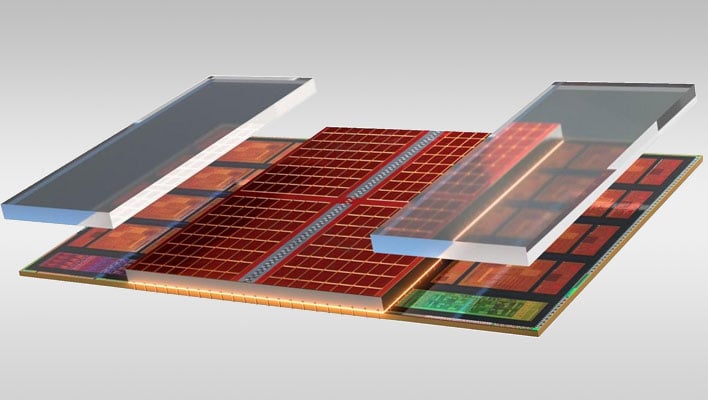It took a few generations, but AMD's stacked 3D V-cache may now be at the point where it can withstand the rigors of overclocking. So goes the latest rumor, which claims that AMD's upcoming Ryzen 9000X3D
processors based on Zen 5 will up the overclocking ante with full support for manual tweaks that extend beyond PBO (Precision Boost Overdrive) and CO (Curve Optimizer) tuning.
To be clear, AMD hasn't even announced any Ryzen 9000X3D models yet, and is instead focused on releasing four SKUs at the outset (at
aggressive pricing, while on the topic of rumors)—Ryzen 9 9950X, Ryzen 9 9900X, Ryzen 7 9700X, and Ryzen 5 9600X. If going by conventional wisdom, we may not see any Ryzen 9000X3D chips until CES (next January). Or will we?
Just a few weeks ago, yet another rumor claimed that AMD plans to shake things up by releasing 3D V-cache variants sooner than expected, and specifically in September. It's said these will arrive alongside new motherboards based on AMD's upcoming X870E chipset.
What about overclocking support? The folks at WCCFTech are confidently claiming that the Ryzen 9000X3D series will fully support overclocking on launch day, whenever that might be. They don't cite a source so take it with a spoonful of salt, but they also frame their reporting in absolute terms rather than leaving open the possibility that the chips won't fully embrace overclocking.
If they're correct, this would be a big deal for AMD and its Zen 5 stack. The primary benefit of heaping on stacks of 3D V-cache is to bolster gaming performance, and with AMD's initial foray into this territory with its Ryzen 5000X3D lineup, the trade off was that overclocking was off the table. At the time,
AMD explained to us why during a 2.5 Geeks podcast.
"On the desktop parts, you've seen us ship parts that range up to 1.45 or event 1.5 volts in boost and that is not the limit for 3D V-cache technology. The voltage limit on [3D V-cache technology] is more like 1.3 to 1.35 volts," Hallock explained. "So, we are not going to allow overclocking, CPU core frequency overclocking or core voltage adjustment."
Fast forward a generation to the Ryzen 7000X3D series based on Zen 4, and AMD enabled support for PBO and CO. Even so, we didn't find a much room to budge in our
Ryzen 7 7800X3D review.
"The Ryzen 7 7800X3D is capped at 5,050MHz frequency, and tinkering with various settings in Curve Optimizer only yielded minor temperature and power reductions. Even in conjunction with PBO, we simply weren't getting any meaningful performance improvements," we wrote at the time.
We saw slightly better results in our
Ryzen 9 7950X3D review with full
EXPO (Extended Profiles for Overclocking) memory support on tap, but still just nominal gains.
If the Ryzen 9000X3D does indeed debut with
full overclocking support as rumored, it could be a potential game changer, and also a timely one with rival Intel getting ready to roll out its
Arrow Lake processors. That's rife with caveats, though, such as other potential safeguards being put into place and how much overclocking headroom the Ryzen 9000X3D series will actually be able to handle, even with manual OC controls no longer being off limits. Here's hoping we find out sooner than later.

